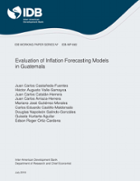Evaluation of Inflation Forecasting Models in Guatemala
Date
Jul 2018
Forecasting the inflation path is an important task for central banks in an inflation targeting regime. Therefore, central banks must continuously evaluate the forecasting accuracy of the models used to generate inflation forecasts. In this paper, we evaluate the performance of most of the models that produce either unconditional or conditional inflation forecasts at Banco de Guatemala. The paper is divided in two main parts. In the first part, we evaluate the forecasting accuracy and efficiency of the models that produce unconditional forecasts, applying different measures as normality test, root mean square error (RMSE), mean percentage errors (MPA), and some test as Diebold–Mariano, Pesaran–Timmerman, Giacomini–Rossi, and both weak and efficiency tests. In the second part, we evaluate the conditional forecasting performance of the central bank’s main macroeconomic models by generating in sample forecasts in hindsight for different scenarios for exogenous and some endogenous variables. We find evidence supporting the claim that the time series models perform better in forecasting inflation for short time horizons while the structural macroeconomic models do better in medium and long time horizons.




